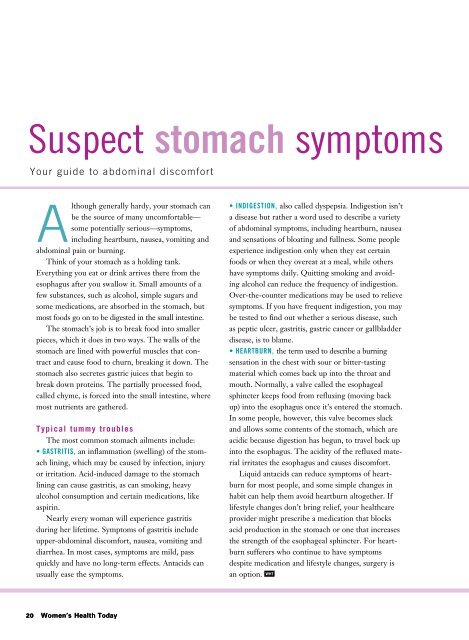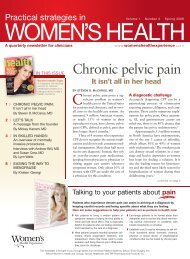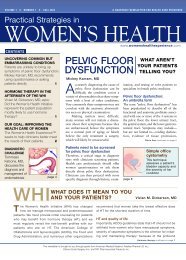Alicia Silverstone - The Christ Hospital
Alicia Silverstone - The Christ Hospital
Alicia Silverstone - The Christ Hospital
- No tags were found...
Create successful ePaper yourself
Turn your PDF publications into a flip-book with our unique Google optimized e-Paper software.
Suspect stomach symptomsYour guide to abdominal discomfortAlthough generally hardy, your stomach canbe the source of many uncomfortable—some potentially serious—symptoms,including heartburn, nausea, vomiting andabdominal pain or burning.Think of your stomach as a holding tank.Everything you eat or drink arrives there from theesophagus after you swallow it. Small amounts of afew substances, such as alcohol, simple sugars andsome medications, are absorbed in the stomach, butmost foods go on to be digested in the small intestine.<strong>The</strong> stomach’s job is to break food into smallerpieces, which it does in two ways. <strong>The</strong> walls of thestomach are lined with powerful muscles that contractand cause food to churn, breaking it down. <strong>The</strong>stomach also secretes gastric juices that begin tobreak down proteins. <strong>The</strong> partially processed food,called chyme, is forced into the small intestine, wheremost nutrients are gathered.Typical tummy troubles<strong>The</strong> most common stomach ailments include:• Gastritis, an inflammation (swelling) of the stomachlining, which may be caused by infection, injuryor irritation. Acid-induced damage to the stomachlining can cause gastritis, as can smoking, heavyalcohol consumption and certain medications, likeaspirin.Nearly every woman will experience gastritisduring her lifetime. Symptoms of gastritis includeupper-abdominal discomfort, nausea, vomiting anddiarrhea. In most cases, symptoms are mild, passquickly and have no long-term effects. Antacids canusually ease the symptoms.• Indigestion, also called dyspepsia. Indigestion isn’ta disease but rather a word used to describe a varietyof abdominal symptoms, including heartburn, nauseaand sensations of bloating and fullness. Some peopleexperience indigestion only when they eat certainfoods or when they overeat at a meal, while othershave symptoms daily. Quitting smoking and avoidingalcohol can reduce the frequency of indigestion.Over-the-counter medications may be used to relievesymptoms. If you have frequent indigestion, you maybe tested to find out whether a serious disease, suchas peptic ulcer, gastritis, gastric cancer or gallbladderdisease, is to blame.• Heartburn, the term used to describe a burningsensation in the chest with sour or bitter-tastingmaterial which comes back up into the throat andmouth. Normally, a valve called the esophagealsphincter keeps food from refluxing (moving backup) into the esophagus once it’s entered the stomach.In some people, however, this valve becomes slackand allows some contents of the stomach, which areacidic because digestion has begun, to travel back upinto the esophagus. <strong>The</strong> acidity of the refluxed materialirritates the esophagus and causes discomfort.Liquid antacids can reduce symptoms of heartburnfor most people, and some simple changes inhabit can help them avoid heartburn altogether. Iflifestyle changes don’t bring relief, your healthcareprovider might prescribe a medication that blocksacid production in the stomach or one that increasesthe strength of the esophageal sphincter. For heartburnsufferers who continue to have symptomsdespite medication and lifestyle changes, surgery isan option. WHT20Women’s Health Today
















